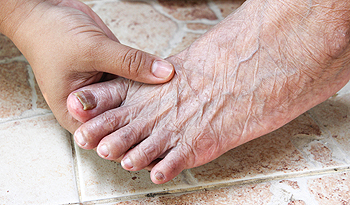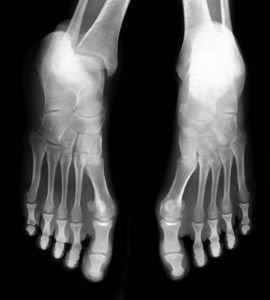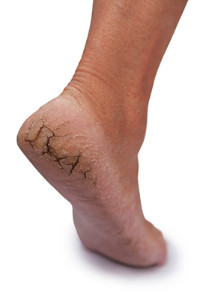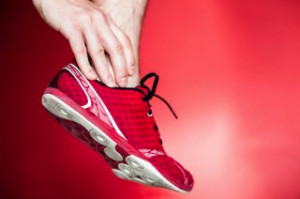Items filtered by date: September 2017
The Elderly and Foot Health
 Taking good care of your feet becomes more important as you get older. Age tends to exacerbate foot issues, with many people over the age of 65 reportedly suffering from foot pain. Another common issue among the elderly is diabetes. Diabetes causes neuropathy, or nerve loss, in the lower body, especially in the feet. Diabetics suffer from poor blood circulation in the legs and feet as well. This means that if a diabetic sustains a wound, they may not realize it due to loss of sensation, and the wound may not heal properly. In severe cases, amputation may be necessary if the infection significantly worsens. Because of this, elderly diabetics need to take extra care of their feet, though most elderly people will also benefit from practicing good foot health. Good foot health strategies include daily foot inspections for any abnormalities, washing and drying the feet, keeping one's diabetes in check, and wearing quality socks and footwear that will protect the feet and provide ample foot support. Finally, performing a check-up with a podiatrist yearly is also recommended.
Taking good care of your feet becomes more important as you get older. Age tends to exacerbate foot issues, with many people over the age of 65 reportedly suffering from foot pain. Another common issue among the elderly is diabetes. Diabetes causes neuropathy, or nerve loss, in the lower body, especially in the feet. Diabetics suffer from poor blood circulation in the legs and feet as well. This means that if a diabetic sustains a wound, they may not realize it due to loss of sensation, and the wound may not heal properly. In severe cases, amputation may be necessary if the infection significantly worsens. Because of this, elderly diabetics need to take extra care of their feet, though most elderly people will also benefit from practicing good foot health. Good foot health strategies include daily foot inspections for any abnormalities, washing and drying the feet, keeping one's diabetes in check, and wearing quality socks and footwear that will protect the feet and provide ample foot support. Finally, performing a check-up with a podiatrist yearly is also recommended.
Proper foot care is something many older adults forget to consider. If you have any concerns about your feet and ankles, contact Dr. Ronald Sheppard from Warren-Watchung Podiatry Center. Our doctor can provide the care you need to keep you pain-free and on your feet.
The Elderly and Their Feet
As we age we start to notice many changes in our body, but the elder population may not notice them right away. Medical conditions may prevent the elderly to take notice of their foot health right away. Poor vision is a lead contributor to not taking action for the elderly.
Common Conditions
- Neuropathy – can reduce feeling in the feet and can hide many life-threatening medical conditions.
- Reduced flexibility – prevents the ability of proper toenail trimming, and foot cleaning. If left untreated, it may lead to further medical issues.
- Foot sores – amongst the older population can be serious before they are discovered. Some of the problematic conditions they may face are:
- Gouging toenails affecting nearby toe
- Shoes that don’t fit properly
- Pressure sores
- Loss of circulation in legs & feet
- Edema & swelling of feet and ankles
Susceptible Infections
Diabetes and poor circulation can cause general loss of sensitivity over the years, turning a simple cut into a serious issue.
If you have any questions please feel free to contact one of our offices located in Marlboro and Watchung, NJ . We offer the newest diagnostic and treatment technologies for all your foot and ankle needs.
How to Prevent Stress Fractures
 Stress fractures are small cracks in the bone typically caused by repetitive force or stress. While they can occur in various areas of the body, stress fractures are more likely to occur in the foot due to it having to bear weight and having to sustain repeated strikes. They can be very painful and often take time to properly heal. To avoid dealing with stress fractures, practice methods to prevent them from occurring. If you are starting a new physical activity, prevent stress fractures by taking it slowly and gradually increasing intensity and duration. This prevents overuse and allows your body to acclimate to physical stress. Footwear that provides proper support can improve your running style and prevent stress fractures. The surfaces you run on can also affect your risk for injury. Soft surfaces like grass can be more forgiving than harder surfaces like concrete. If you have questions about stress fractures and whether running is right for you, ask a podiatrist.
Stress fractures are small cracks in the bone typically caused by repetitive force or stress. While they can occur in various areas of the body, stress fractures are more likely to occur in the foot due to it having to bear weight and having to sustain repeated strikes. They can be very painful and often take time to properly heal. To avoid dealing with stress fractures, practice methods to prevent them from occurring. If you are starting a new physical activity, prevent stress fractures by taking it slowly and gradually increasing intensity and duration. This prevents overuse and allows your body to acclimate to physical stress. Footwear that provides proper support can improve your running style and prevent stress fractures. The surfaces you run on can also affect your risk for injury. Soft surfaces like grass can be more forgiving than harder surfaces like concrete. If you have questions about stress fractures and whether running is right for you, ask a podiatrist.
Activities where too much pressure is put on the feet can cause stress fractures. To learn more, contact Dr. Ronald Sheppard from Warren-Watchung Podiatry Center. Our doctor can provide the care you need to keep your pain free and on your feet.
Dealing with Stress Fractures of the Foot and Ankle
Stress fractures occur in the foot and ankle when muscles in these areas weaken from too much or too little use. The feet and ankles then lose support when walking or running from the impact of the ground. Since there is no protection, the bones receive the full impact of each step. Stress on the feet can cause cracks to form in the bones, thus creating stress fractures.
What Are Stress Fractures?
Stress fractures occur frequently in individuals whose daily activities cause great impact on the feet and ankles. Stress factors are most common among:
- Runners
- People affected with Osteoporosis
- Tennis or basketball players
- Gymnasts
- High impact workouts
Symptoms
Pain from the fractures occur in the area of the fractures and can be constant or intermittent. It will often cause sharp or dull pain with swelling and tenderness. Engaging in any kind of activity which involves high impact will aggravate pain.
If you have any questions please feel free to contact one of our offices located in Marlboro and Watchung, NJ . We offer the newest diagnostic and treatment technologies for all your foot and ankle needs.
How to Fix Cracked Heels
 Cracked heels can affect anyone and are a common foot ailment. Thankfully, the condition typically isn’t serious in most cases and can be taken care of. Moisturizers are a good way to revitalize skin and prevent further skin from drying. Applying moisturizer twice a day—once in the morning and once at night—should be sufficient. Soaking your feet can also help moisturize the skin and is very relaxing. Be sure to properly dry the feet when finished, and apply moisturizer. It is not recommended to remove skin from the area by yourself because this can damage the new skin layer or potentially create a wound. If you have cracked heels that bother you and won’t go away, see your podiatrist for treatment.
Cracked heels can affect anyone and are a common foot ailment. Thankfully, the condition typically isn’t serious in most cases and can be taken care of. Moisturizers are a good way to revitalize skin and prevent further skin from drying. Applying moisturizer twice a day—once in the morning and once at night—should be sufficient. Soaking your feet can also help moisturize the skin and is very relaxing. Be sure to properly dry the feet when finished, and apply moisturizer. It is not recommended to remove skin from the area by yourself because this can damage the new skin layer or potentially create a wound. If you have cracked heels that bother you and won’t go away, see your podiatrist for treatment.
Cracked heels are unsightly and can cause further damage to your shoes and feet. If you have any concerns, contact Dr. Ronald Sheppard from Warren-Watchung Podiatry Center. Our doctor can provide the care you need to keep you pain-free and on your feet.
Cracked Heels
Cracked heels appear unappealing and can make it harder for you walk around in sandals. Aside from looking unpleasant, cracked heels can also tear stockings, socks, and wear out your shoes. There are several methods to help restore a cracked heel and prevent further damage.
How Do You Get Them?
Dry skin is the number one culprit in creating cracked heels. Many athletes, walkers, joggers, and even swimmers suffer from cracked heels. Age and skin oil production play a role to getting cracked heels as well.
Promote Healing
Over the counter medicines can help, especially for those that need instant relief or who suffer from chronic dry feet.
Wear Socks – Wearing socks with medicated creams helps lock in moisture.
Moisturizers – Applying both day and night will help alleviate dryness which causes cracking.
Pumice Stones – These exfoliate and remove dead skin, which allows for smoother moisturizer application and better absorption into the skin.
Change in Diet
Eating healthy with a well-balanced diet will give the skin a fresh and radiant look. Your body responds to the kinds of food you ingest. Omega-3 fatty acids and zinc supplements can also revitalize skin tissue.
Most importantly, seek professional help if unsure how to proceed in treating cracked heels. A podiatrist will help you with any questions or information needed.
If you have any questions, please feel free to contact one of our offices located in Marlboro and Watchung, NJ . We offer the newest diagnostic and treatment technologies for all your foot care needs.
How to Pick New Running Shoes
 Choosing the right running shoes for you can mean the difference between comfort and potential injury. Not all running shoes are built the same. They vary not just in foot size and style but also in the surfaces they were designed for. If you run on trails, a trail running shoe is a better choice than a running shoe designed for roads or the track. The shoe should have enough space so your feet aren’t cramped but should still be snug. Knowing whether your foot rolls in too much (overpronation), rolls out too much (underpronation), or stays where it is (neutral) when you step can also determine what shoe is right for you. However it is advised to not worry too much about foot roll. The most important part is comfort. You should be able to wear the shoes for long periods without feeling pain or discomfort.
Choosing the right running shoes for you can mean the difference between comfort and potential injury. Not all running shoes are built the same. They vary not just in foot size and style but also in the surfaces they were designed for. If you run on trails, a trail running shoe is a better choice than a running shoe designed for roads or the track. The shoe should have enough space so your feet aren’t cramped but should still be snug. Knowing whether your foot rolls in too much (overpronation), rolls out too much (underpronation), or stays where it is (neutral) when you step can also determine what shoe is right for you. However it is advised to not worry too much about foot roll. The most important part is comfort. You should be able to wear the shoes for long periods without feeling pain or discomfort.
If you are a runner, wearing the right running shoe is essential. For more information, contact Dr. Ronald Sheppard from Warren-Watchung Podiatry Center. Our doctor can provide the care you need to keep you pain-free and on your feet.
Choosing the Right Running Shoe for Your Foot Type
To increase performance and avoid the risk of injury, it is important to choose the right running shoe based on your foot type. The general design of running shoes revolves around pronation, which is how the ankle rolls from outside to inside when the foot strikes the ground.
- Neutral runners are able to choose from a wide variety of shoes, including minimalist shoes or even going barefoot.
- Runners who overpronate, or experience an over-abundance of ankle rolling, should choose shoes that provide extra motion control and stability.
- Runners who underpronate, or supinate, have feet that have high arches and lack flexibility, preventing shock absorption. They require shoes with more flexibility and cushion.
If you have any questions please feel free to contact one of our offices located in Marlboro and Watchung, NJ . We offer the newest diagnostic and treatment technologies for all your foot and ankle needs.
